Reed College President’s Summer Fellowship
The President’s Summer Fellowship offers students a chance to think big and tackle a summer project that combines intellectual pursuit, imagination, adventure, personal transformation, and service to the greater good. The program was established in 2012 and is made possible with generous support from Dan Greenberg '62 and Susan Steinhauser.
President's Summer Fellowship Winners 2023
Reed is proud to announce the winners of the President’s Summer Fellowship for 2023.
Andee Gude '26
The Black Capital of America: Harlem’s Art Scene
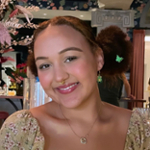 For decades Black artists have been excluded from large scale museums, and following their long awaited introduction, were curated and placed through white lenses with histories of white supremacy. This is why sacred Black art spaces, created and curated by Black artists, are so important. Exploring these spaces in the Black capital of the world, Harlem, will give me a first hand account of Black art without barriers of oppression, something that is not available to explore vividly in Portland. I am interested in how far art can flourish when it ascends the constraints of whiteness. As a Black American studying race and art history, I seek to be intimately familiar with my culture; thus, it is essential that I explore these types of spaces. My project will explore these places and contrast them with large scale museums in Portland. I will document my journey through recordings, interviews, photography and more, and end my project with an exhibit at Reed college. Within this, I am seeking to evoke conversations towards the limits of Black art imposed by historically oppressive systems, and compare a predominantly Black area to a generally white one through my own art, comparative analysis and observation.
For decades Black artists have been excluded from large scale museums, and following their long awaited introduction, were curated and placed through white lenses with histories of white supremacy. This is why sacred Black art spaces, created and curated by Black artists, are so important. Exploring these spaces in the Black capital of the world, Harlem, will give me a first hand account of Black art without barriers of oppression, something that is not available to explore vividly in Portland. I am interested in how far art can flourish when it ascends the constraints of whiteness. As a Black American studying race and art history, I seek to be intimately familiar with my culture; thus, it is essential that I explore these types of spaces. My project will explore these places and contrast them with large scale museums in Portland. I will document my journey through recordings, interviews, photography and more, and end my project with an exhibit at Reed college. Within this, I am seeking to evoke conversations towards the limits of Black art imposed by historically oppressive systems, and compare a predominantly Black area to a generally white one through my own art, comparative analysis and observation.
Arley Sakai '24
Staging Stardust: Exploring Queer Identity through Musical Personas
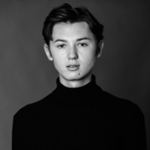 Gender-bending caricatures. Homoerotic alter egos. Queer voices, experiences, and identities, reimagined through embodied performances—this is the essence of queer musical personas (QMPs). Staging Stardust is a hybrid academic-creative investigation into the history, making, and significance of past and present QMPs. My project will shed light on queer musicians’ sonic and aesthetic influence on contemporary culture and will actively engage in their legacy through the development of my own QMP. To achieve this, I will first compile an extensive list of QMPs (and other significant queer personas in cinema and performing arts) in an attempt to chronicle the exuberant yet overlooked history of staged queer narratives. Building from these studies, I will undergo the formation of my own QMP. Shaping an artistically-convincing persona will require an intriguing narrative, a distinct aesthetic vision, and ultimately, a few songs to materialize the character. I will exercise my background in creative writing, visual arts, and music-making to fashion my QMP, who will stand not just for my own artistic ideation, but also for the path-paving work of those musicians before me, whose contributions to music and queer representation in media has shaped who I and countless other queer people are today.
Gender-bending caricatures. Homoerotic alter egos. Queer voices, experiences, and identities, reimagined through embodied performances—this is the essence of queer musical personas (QMPs). Staging Stardust is a hybrid academic-creative investigation into the history, making, and significance of past and present QMPs. My project will shed light on queer musicians’ sonic and aesthetic influence on contemporary culture and will actively engage in their legacy through the development of my own QMP. To achieve this, I will first compile an extensive list of QMPs (and other significant queer personas in cinema and performing arts) in an attempt to chronicle the exuberant yet overlooked history of staged queer narratives. Building from these studies, I will undergo the formation of my own QMP. Shaping an artistically-convincing persona will require an intriguing narrative, a distinct aesthetic vision, and ultimately, a few songs to materialize the character. I will exercise my background in creative writing, visual arts, and music-making to fashion my QMP, who will stand not just for my own artistic ideation, but also for the path-paving work of those musicians before me, whose contributions to music and queer representation in media has shaped who I and countless other queer people are today.
Dani Peterson '24
Embodying the Intangible: Translating Genealogy Into Movement
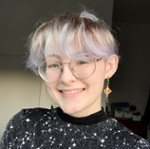 Within the confines of America’s strict racial categories, the stories of mixed people are often lost in translation. People whose identities are not immediately legible are relegated to an isolating obscurity. For this project, I will be traveling across the west coast to meet with members of my family to investigate our own Chinese-Latine heritage, our immigration stories, and how we negotiate our intersecting identities. I will endeavor to begin uncovering marginalized narratives, starting with the stories of my own family. Together, we will sift through memories, oral histories, and dusty attics to compile a comprehensive narrative of our family that was previously intangible. I will then translate these lived experiences into an embodied form, so that my family’s stories may take on a life of their own. The goal is to create a series of dances that, through their creation and performance, draw family members across generational lines together by making our lived experiences legible to the rest of the world. I will give shape to the stories that define my family and embody the intergenerational ties that bind us together. In doing so, I hope to convey valuable insights about the experience of Asian-Latine people in America.
Within the confines of America’s strict racial categories, the stories of mixed people are often lost in translation. People whose identities are not immediately legible are relegated to an isolating obscurity. For this project, I will be traveling across the west coast to meet with members of my family to investigate our own Chinese-Latine heritage, our immigration stories, and how we negotiate our intersecting identities. I will endeavor to begin uncovering marginalized narratives, starting with the stories of my own family. Together, we will sift through memories, oral histories, and dusty attics to compile a comprehensive narrative of our family that was previously intangible. I will then translate these lived experiences into an embodied form, so that my family’s stories may take on a life of their own. The goal is to create a series of dances that, through their creation and performance, draw family members across generational lines together by making our lived experiences legible to the rest of the world. I will give shape to the stories that define my family and embody the intergenerational ties that bind us together. In doing so, I hope to convey valuable insights about the experience of Asian-Latine people in America.
Kesna Vounzi ‘24
Receipts Revival: Phase One
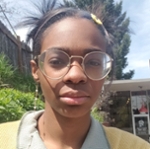 Since participating in the Multicultural Resource Center's Peer Mentor Program, I have been connected to people and movements across Reed's history from the Black Student Union protests in the 60s for educational self-determination to the 2016–2018 Reedies Against Racism protests critiquing treatment of marginalized students. Institutional memory, though, is more than just the big moments in Reed's history—it is also about the everyday moments we neglect to preserve. I aim to pay homage to the everyday forms of resistance and joy students of color have practiced, even during turbulent times. I will create a website that preserves digital versions of past publications by students of color starting with Receipts and Tend Yr Garden. Working with the archives and the MRC/SEEDs community, the website will also house a calendar of all the past events hosted by student affinity groups and departments under OID from as far back as possible. One of the main features of the website will be connecting the past to the future by dedicating a page to resources for students to learn about the history of student protests and a prose poem I will write that captures the experiences of students of color after the pandemic.
Since participating in the Multicultural Resource Center's Peer Mentor Program, I have been connected to people and movements across Reed's history from the Black Student Union protests in the 60s for educational self-determination to the 2016–2018 Reedies Against Racism protests critiquing treatment of marginalized students. Institutional memory, though, is more than just the big moments in Reed's history—it is also about the everyday moments we neglect to preserve. I aim to pay homage to the everyday forms of resistance and joy students of color have practiced, even during turbulent times. I will create a website that preserves digital versions of past publications by students of color starting with Receipts and Tend Yr Garden. Working with the archives and the MRC/SEEDs community, the website will also house a calendar of all the past events hosted by student affinity groups and departments under OID from as far back as possible. One of the main features of the website will be connecting the past to the future by dedicating a page to resources for students to learn about the history of student protests and a prose poem I will write that captures the experiences of students of color after the pandemic.
Nick Bridges ‘25
Towards a Techno-Philosophy for the Age of AI: Günther Anders and the Nature of Artifice
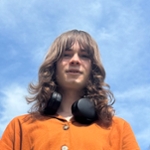 The 20th-century German Jewish philosopher Günther Anders is well known in Europe, but he has remained largely absent from philosophical discussions in American academia. This omission is unfortunate, as Anders’ work on the nature of humankind provides a powerful lens for analyzing our current anxieties about artificial intelligence and related technological advancements. This summer, I will travel to Vienna with the aim of rediscovering, for an American audience, the work of Günther Anders. I will visit the Austrian National Library to investigate Anders’ personal papers, philosophical works and untranslated manuscripts. I also will meet with founding members of the Günther Anders Society in order to come to a better understanding of the contemporary relevance of Anders' work. This combination of archival research, translation and philosophical discussion shall culminate in my attempt to bring Anders’ specific brand of philosophical anthropology to bear on questions concerning contemporary technological anxiety and the relation of mankind to its artifice. Through both the writing of an academic paper and a Paideia class which I will teach upon my return, I shall attempt to propose a philosophical method, grounded in Anders’ work, for engaging with the question of mankind's essence in our current technological age.
The 20th-century German Jewish philosopher Günther Anders is well known in Europe, but he has remained largely absent from philosophical discussions in American academia. This omission is unfortunate, as Anders’ work on the nature of humankind provides a powerful lens for analyzing our current anxieties about artificial intelligence and related technological advancements. This summer, I will travel to Vienna with the aim of rediscovering, for an American audience, the work of Günther Anders. I will visit the Austrian National Library to investigate Anders’ personal papers, philosophical works and untranslated manuscripts. I also will meet with founding members of the Günther Anders Society in order to come to a better understanding of the contemporary relevance of Anders' work. This combination of archival research, translation and philosophical discussion shall culminate in my attempt to bring Anders’ specific brand of philosophical anthropology to bear on questions concerning contemporary technological anxiety and the relation of mankind to its artifice. Through both the writing of an academic paper and a Paideia class which I will teach upon my return, I shall attempt to propose a philosophical method, grounded in Anders’ work, for engaging with the question of mankind's essence in our current technological age.
Reese Schaffer ‘24
One Night Only: An Exploration of Digital Mediation and Queer Events in Portland, Oregon
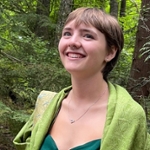 As a young queer person, especially from a suburban area, my experiences of queer communities have largely occurred in digital spaces. As I set out to move to Portland for college three years ago, I imagined that the city would bring me into an in-person queer community upon arrival. Yet, like many others around me, I have found this not to be so simple. Physical space within the queer community has become so closely intertwined with the virtual worlds that gatherings and events are largely mediated through one's connection to virtual social networks— often also constricted by algorithms and the affordances of digital platforms. This summer, I will connect with digital media and sexuality scholar, Stefanie Duguay to explore her previous studies regarding queer events and space making in Montreal. Then I seek to immerse myself in the pop-up gatherings of queer community of Portland while tracing the influence of social media platforms in creating these spaces. I hope to produce a deeper understanding of the intertwined relationships with the real and virtual that communities create through their temporary spaces and gatherings. Further, I seek to understand my own relationships with community, place, and queerness here in Portland.
As a young queer person, especially from a suburban area, my experiences of queer communities have largely occurred in digital spaces. As I set out to move to Portland for college three years ago, I imagined that the city would bring me into an in-person queer community upon arrival. Yet, like many others around me, I have found this not to be so simple. Physical space within the queer community has become so closely intertwined with the virtual worlds that gatherings and events are largely mediated through one's connection to virtual social networks— often also constricted by algorithms and the affordances of digital platforms. This summer, I will connect with digital media and sexuality scholar, Stefanie Duguay to explore her previous studies regarding queer events and space making in Montreal. Then I seek to immerse myself in the pop-up gatherings of queer community of Portland while tracing the influence of social media platforms in creating these spaces. I hope to produce a deeper understanding of the intertwined relationships with the real and virtual that communities create through their temporary spaces and gatherings. Further, I seek to understand my own relationships with community, place, and queerness here in Portland.
Shalra Azeem ‘24
Imperial Legacies: Decolonizing Public Historical Narratives of Mughal India in the Victoria and Albert Museum
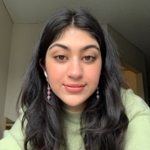 Though the Victoria and Albert Museum boasts one of the richest South Asian collections in the Western world, thousands of its items were integrated into the museum from the Great Exhibition of 1851, which helped legitimize British colonization of India to the British public, and the Indian Museum, a creation of the East India Company, which was responsible for the looting and acquisition of Indian art and artifacts. The current curation of the South Asian collection in the V&A fails to consider how the acquisition of these objects by means of colonialism alters the relationships between the artifacts, the museum, and the public. I aim to explore these relationships by focusing on the V&A’s Mughal collection. I will document my research with a blog, recording my findings about the complete history of items in the collection, decolonization practices and how they can enrich the current historical narrative, and a non-Western reading of Mughal history. Additionally, I will rework museum labels of the art and objects to display a more nuanced narrative. With this interdisciplinary project, I will engage with Mughal material culture to inform history and challenge public historical narratives designed by London’s museums to deWesternize and decolonize India’s past.
Though the Victoria and Albert Museum boasts one of the richest South Asian collections in the Western world, thousands of its items were integrated into the museum from the Great Exhibition of 1851, which helped legitimize British colonization of India to the British public, and the Indian Museum, a creation of the East India Company, which was responsible for the looting and acquisition of Indian art and artifacts. The current curation of the South Asian collection in the V&A fails to consider how the acquisition of these objects by means of colonialism alters the relationships between the artifacts, the museum, and the public. I aim to explore these relationships by focusing on the V&A’s Mughal collection. I will document my research with a blog, recording my findings about the complete history of items in the collection, decolonization practices and how they can enrich the current historical narrative, and a non-Western reading of Mughal history. Additionally, I will rework museum labels of the art and objects to display a more nuanced narrative. With this interdisciplinary project, I will engage with Mughal material culture to inform history and challenge public historical narratives designed by London’s museums to deWesternize and decolonize India’s past.
Tommy Schacht ‘25
You Can’t Say That: Our Relationships with Gendered Insults
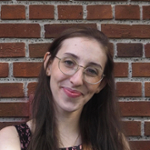 “If you want to insult a woman, call her a prostitute. If you want to insult a man, call him a woman.” This quote, from sociolinguist Amanda Montell, succinctly captures the nature of gendered insults, which I aim to explore through my project. Throughout the course of an eight episode podcast season, I will explore a series of insults and swears targeting women. As a woman, a feminist, and a linguist, I believe in the importance of making informed decisions about the language you use. Words are powerful; they can be used to perpetuate or disrupt the power structures that surround us, often without the speaker even realizing it. Each episode of the podcast will be driven by an anonymous individual’s story about a word that has affected them, and what questions the experience left them with. I will explore the evolution of these words through interviews with linguists and relevant female professionals in order to provide a range of perspectives. Some of these words may be in common usage as derogatory, while others are in the process of being reclaimed. Ultimately, the podcast aims to empower listeners to make informed decisions about how they express themselves through language.
“If you want to insult a woman, call her a prostitute. If you want to insult a man, call him a woman.” This quote, from sociolinguist Amanda Montell, succinctly captures the nature of gendered insults, which I aim to explore through my project. Throughout the course of an eight episode podcast season, I will explore a series of insults and swears targeting women. As a woman, a feminist, and a linguist, I believe in the importance of making informed decisions about the language you use. Words are powerful; they can be used to perpetuate or disrupt the power structures that surround us, often without the speaker even realizing it. Each episode of the podcast will be driven by an anonymous individual’s story about a word that has affected them, and what questions the experience left them with. I will explore the evolution of these words through interviews with linguists and relevant female professionals in order to provide a range of perspectives. Some of these words may be in common usage as derogatory, while others are in the process of being reclaimed. Ultimately, the podcast aims to empower listeners to make informed decisions about how they express themselves through language.
Zonya Tanada ‘24
From Balanchine to Bolshoi: Exploring the History and Pedagogical Approaches of Ballet
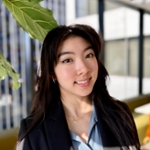 Elegant, graceful, and divisive, ballet has been the epitome of artistic expression and cultural change. The techniques of George Balanchine and Agrippa Vagonava have revolutionized the ballet world, leaving an indelible mark on the art form's evolution from its classical roots to its modern expression. Having trained in ballet since childhood, I have always been inspired by both the Vaganova and Balanchine styles. Through this unique project, I aim to not only nurture my passion for ballet but contribute to ongoing conversations in the dance sphere by exploring the difference in pedagogical approach, sociopolitical history, and cultural attitudes of these two curricula. To achieve this, I will attend ballet classes at both Vaganova and Balanchine-style ballet schools, research archival resources, and conduct interviews with current dancers and teachers from both sides of the performing arts. Over the course of eight weeks, I will document my observations through ethnographic journal entries, focusing on technical components of movement, musicality, artistic expression, and pedagogical approach. The project will culminate in a performance at the college’s Winter 2023 Dance Concert and a lecture presenting my findings to the Dance Department and Reed community.
Elegant, graceful, and divisive, ballet has been the epitome of artistic expression and cultural change. The techniques of George Balanchine and Agrippa Vagonava have revolutionized the ballet world, leaving an indelible mark on the art form's evolution from its classical roots to its modern expression. Having trained in ballet since childhood, I have always been inspired by both the Vaganova and Balanchine styles. Through this unique project, I aim to not only nurture my passion for ballet but contribute to ongoing conversations in the dance sphere by exploring the difference in pedagogical approach, sociopolitical history, and cultural attitudes of these two curricula. To achieve this, I will attend ballet classes at both Vaganova and Balanchine-style ballet schools, research archival resources, and conduct interviews with current dancers and teachers from both sides of the performing arts. Over the course of eight weeks, I will document my observations through ethnographic journal entries, focusing on technical components of movement, musicality, artistic expression, and pedagogical approach. The project will culminate in a performance at the college’s Winter 2023 Dance Concert and a lecture presenting my findings to the Dance Department and Reed community.
Deferred Project Awardee from Summer 2020
Clarissa Lam ‘23
Retracing My Family’s Journey from North Vietnam to Southern California
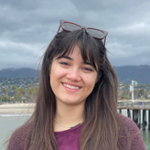 When I visited Vietnam for the first time as a senior in high school, I entered the country with the idea that I already knew the Vietnamese culture. However, I quickly realized that my knowledge is limited to the Vietnamese-American culture. My plan is to follow my grandparents’ migration through Hai Phong, Hanoi, Saigon, Guam, and California. When my grandfather was ten, he was displaced by the First Indochina War; when the country divided, my grandmother and grandfather fled the North; and when Saigon fell, they were forced out of the country with eleven children in tow. From there they entered a refugee camp in Guam, and later, another in California, before restarting their lives there. In January 2020, I began a short film about their journey, completing interviews of both my grandparents. During my fellowship experience, I will film b-roll footage and acquire archival footage from museums, publications, and universities to help me complete the film. I also hope to take portrait photos of other refugees after returning to the U.S. and write 1–2 paragraph summaries of their experiences in order to examine how other Vietnamese migrations differed from my family’s. This trip is a chance for me to return to Vietnam with open eyes in the hopes of learning about my family history through a Vietnamese lens rather than an American one.
When I visited Vietnam for the first time as a senior in high school, I entered the country with the idea that I already knew the Vietnamese culture. However, I quickly realized that my knowledge is limited to the Vietnamese-American culture. My plan is to follow my grandparents’ migration through Hai Phong, Hanoi, Saigon, Guam, and California. When my grandfather was ten, he was displaced by the First Indochina War; when the country divided, my grandmother and grandfather fled the North; and when Saigon fell, they were forced out of the country with eleven children in tow. From there they entered a refugee camp in Guam, and later, another in California, before restarting their lives there. In January 2020, I began a short film about their journey, completing interviews of both my grandparents. During my fellowship experience, I will film b-roll footage and acquire archival footage from museums, publications, and universities to help me complete the film. I also hope to take portrait photos of other refugees after returning to the U.S. and write 1–2 paragraph summaries of their experiences in order to examine how other Vietnamese migrations differed from my family’s. This trip is a chance for me to return to Vietnam with open eyes in the hopes of learning about my family history through a Vietnamese lens rather than an American one.